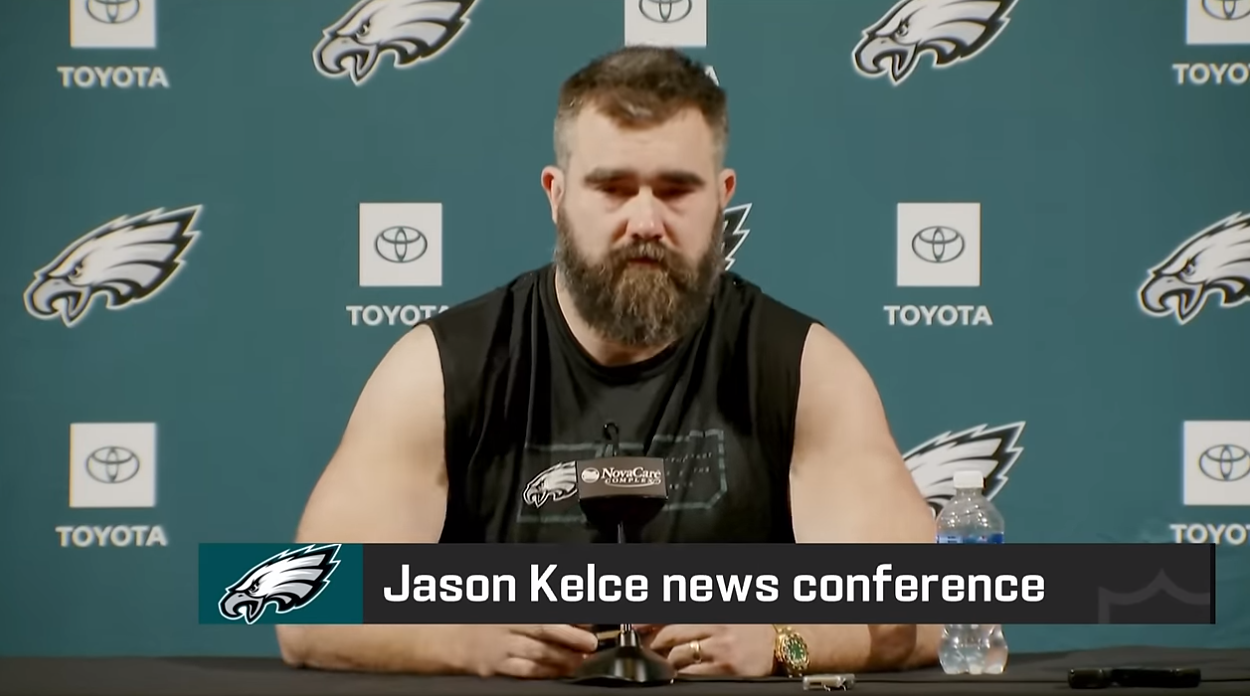
Future NFL Hall of Famer Jason Kelce’s emotional retirement speech is yet another reminder of just how important to American society fathers are. Dan O’Donnell has the stunning statistics.
Mar. 6, 2024
Perspective by Dan O’Donnell
Jason Kelce doesn’t seem at first glance like an emotional man. A bone-rattling, beer-chugging behemoth, he shed more would-be tacklers than tears as an All-Pro center for the Philadelphia Eagles. But during his retirement ceremony Monday, he opened his heart and didn’t leave a dry eye in the house.
“I think one of the best things a person can be in this world is a father,” he said. “A father who is present, loving (and) devoted just might be the greatest gift a child can ask for in our society, and I have a (expletive) good one.”
Then, choking back tears, he acknowledged his father, who was sitting in the front row.
“My father believed in me more than anyone, whenever my own insecurities would arise or self-doubt would come in, he would stifle them with the warm embrace of belief, unwavering love, and belief. He was the man and continues to be the man I strive to be.”
In a speech filled with touching moments, this was possibly the most poignant and unquestionably the most significant. America has for decades faced a crisis of fatherlessness with devastating impacts across all facets of life.
Approximately 18 million children in the United States—one in every four—live without a biological, adopted, or stepfather in their home; far and away the highest percentage in the developed world. Nearly 46% of children in fatherless households live in poverty compared with just 9.5% of children in two-parent homes, making fatherlessness the single biggest predictor of childhood poverty.
Children without a father in the home are also 45% more likely to have to repeat a grade in school, 60% more likely to be suspended or expelled, and 75% more likely to become a teenaged parent.
71% of high school dropouts come from fatherless homes. So do 90% of homeless and runaway children. So do 85% of children with emotional and behavioral disorders. And so do, tragically, 63% of the children who die by suicide.
Conversely, when their father is present and involved in their lives, kids are 40% more likely to get good grades and 50% more likely to attend college or find steady employment after high school graduation. Even in young adulthood, the benefits of growing up in a two-parent family are enormous: Those who did are far more likely to graduate from college and, on average, earn significantly more money than those raised in single-parent homes.
Fatherless children are much more likely to turn to crime, which has decimated American cities since the 1960s. It is no coincidence that the breakdown of the nuclear family during the Great Society era coincided with an explosion in the national crime rate.
Researchers have actually known about the link between fatherlessness and criminality far earlier. In 1829 and 1830, officials at Auburn Penitentiary studied the biographies of their inmates and issued reports to the New York State Legislature suggesting that “family disintegration resulting from the death, desertion, or divorce of parents led to undisciplined children who eventually became criminals.”
Nearly two centuries later, this appears to be the case. Children in single-parent families today are 279% more likely to carry guns or sell drugs and fully 70% of all juveniles in state detention facilities come from single-parent homes. That criminal behavior doesn’t stop when they leave the home; it only gets worse—and American society at large is the victim.
The Institute for Family Studies recently concluded that “cities are safer when two-parent families are dominant and more crime-ridden when family instability is common.” Crime is nearly twice as high in cities that “have above the median share of single-parent families, compared to cities that have fewer single-parent families.”
Not every child from a single-parent family will become a criminal, of course, just as not every child from a two-parent home will become an All-Pro center for the Philadelphia Eagles. But Jason Kelce was more correct than perhaps even he knows: One of the most important things a man can be in this world is a father.